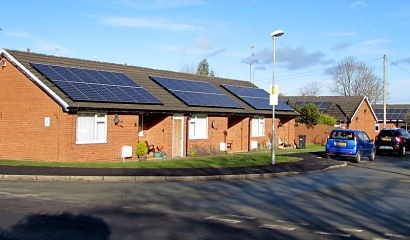Trade association Solar Energy UK is expecting solar PV panels to be part of a default package to meet forthcoming rules on the energy efficiency of homes and buildings in England, currently being discussed as part of a consultation on government standards released yesterday.

The consultation on the Future Homes Standard and Future Buildings Standard says that the revised specifications will have to deliver significant carbon savings, affordable running costs over the long term and prevent the use gas or other fossils for heating and hot water – thus avoiding costly retrofits in the future. The standards must also be affordable, practical and safe.
However, the possibility of solar energy not becoming all but mandatory, when it is already a common feature of newbuild housing, has been condemned by the industry – especially after such a long wait for the consultation to emerge.
The measures outlined in the consultation are effectively a replacement for Zero Carbon Homes, a policy announced by then-chancellor Gordon Brown in 2006. It would have required new homes to generate at least as much energy as they consumed for heating, hot water, ventilation and lighting from 2016 but was scrapped by David Cameron in 2015, following lobbying by the building sector.
The consultation discusses two possible options for homes, which would both result in lower bills as they feature, “a high-efficiency air source heat pump and good fabric standards to minimise heat loss from windows, walls, floors and roofs.”
It does not state explicitly which would be preferred, although it does betray a lack of enthusiasm for not adopting solar energy, describing it as the “minimal option”.
Option 1 includes “high-efficiency solar PV panels covering the equivalent of 40 percent of the home’s ground floor area”. The proposal “balances higher additional build costs against even lower consumer bills – by including solar PV panels, a wastewater heat recovery system, increased airtightness and a decentralised mechanical ventilation (dMEV) system.
Option 2, which does not include those elements, would have lower additional build costs but be less beneficial in terms of consumer bills,” says the paper.
Option 1 would increase costs for homebuilders by an estimated £6,200 on average. However, this would be offset greatly by cutting annual heating and hot water bills by an estimated £910-£2,120 per year. A lower electricity bill would come on top, though it is not described in the consultation.
“A heat pump and a solar installation make a great pairing, as the one helps to power the other, while relieving strain on the power grid” said Chris Hewett, Chief Executive of trade association Solar Energy UK. “Our Value of New Build Solar report illustrates just how much the savings can be – up to £40,000 over their lifetime for a mid-terrace home, or upwards of £200,000 for a detached house.”
In contrast, option 2 would be about £1,000 more expensive to build than the current baseline, while saving only £210-£1,420 per year on running costs. For context, the cost to retrofit a typical existing home to net zero standards (before subsidies are considered) would be about £12,000, according to the paper, or even more if fabric upgrades are needed.
The performance standards set out in the consultation are based on ‘notional buildings’ – essentially a model of energy performance – using air-source heat pumps or high-efficiency fourth-generation heat networks – amendments to which are being consulted on separately.
“We found no practical way to allow the installation of fossil fuel boilers while also delivering significant carbon savings and ‘zero-carbon ready’ homes” the paper adds. “As such, we do not expect fossil fuel heating, such as gas, hybrid heat pumps and hydrogen-ready boilers, will meet these standards. The standards proposed are also unlikely to allow the installation of biofuel systems, including wood and manufactured solid fuels.”
Implementing regulations are expected to be published next year, to enter into force in 2025.
The department’s intentions for non-domestic buildings are clearer, unambiguously recommending the adoption of solar PV spanning 40 percent of the building’s foundation area and heat pump heating for buildings lit from the side (such as offices, hotels and schools), or 75 percent for top-lit spaces (such as warehouses and sports halls), with radiant electric heating. Connection to a fourth-generation heat network would also be acceptable.
Cost increases would be small – 2.1 percent for option 1 or 1.9 percent for option 2 for an air-conditioned office, for example. Adopting option 1 for warehouses would add almost 6 percent to the costs, although as the sector is keen to expand solar generation, that should not be seen as an impediment.
“In all, the plans are another welcome step towards a truly solar nation” added Mr Hewett. “Although we are pleased that the Government is minded to make solar energy effectively mandatory on new non-domestic buildings, it is shocking that not doing so for homes is even on the table. Almost two decades after the Zero Carbon Homes policy was put forward and eight years after it was scrapped, the Government again runs the risk of a massive own goal. Solar Energy UK will press vigorously for solar to be applied to newbuild housing – cutting bills, saving carbon and helping us all move towards net zero.”
 Pages you might like
Pages you might like








 Latest information
Latest information
 Follow official account
Follow official account
 Online support
Online support
 鄂ICP备2022017323号
鄂ICP备2022017323号
 鄂公网安备 42018502006493
鄂公网安备 42018502006493
 Launch Exhibition
Launch Exhibition
 Release information
Release information



 Today's topic
Today's topic








